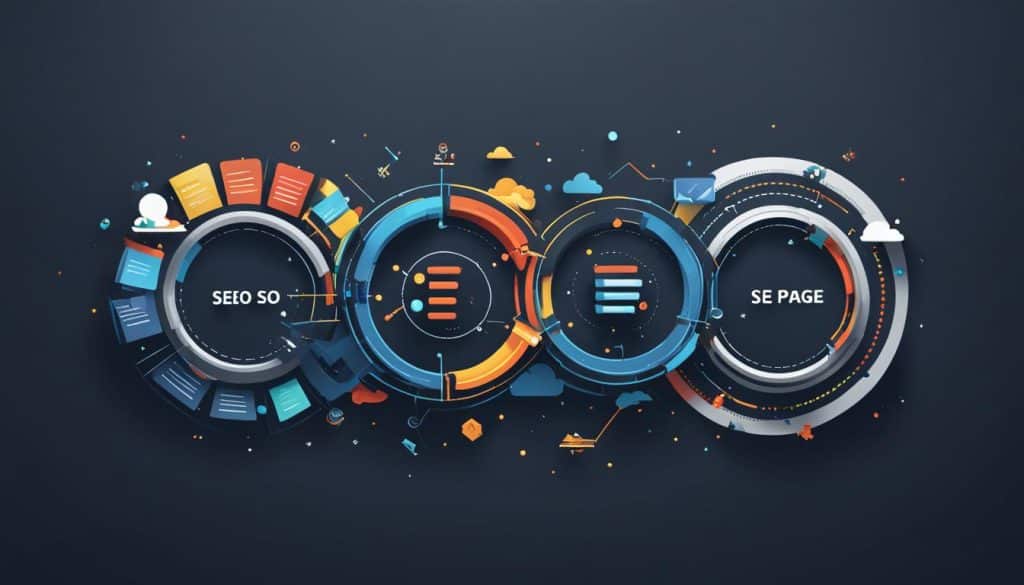In the world of search engine optimization (SEO), off-page optimization plays a crucial role in boosting your website’s rankings and driving organic traffic. By implementing effective off-page SEO techniques, you can improve your website’s visibility, credibility, and authority. These techniques include link building, social media marketing, guest posting, influencer outreach, content marketing, and online reputation management.
Off-page optimization refers to the activities that are conducted outside of your website to enhance its presence and reputation on the internet. It involves building quality backlinks from authoritative websites, engaging with your audience on social media platforms, contributing valuable content to other websites, and managing your online reputation to establish trust and credibility.
By focusing on off-page SEO, you can expand your reach, attract a larger audience, and improve your website’s rankings in search engine results. As search engines consider off-page factors like the number and quality of backlinks, social signals, and online reviews, incorporating these techniques into your SEO strategy is essential for long-term success.
Ready to take your SEO to the next level? In this article, we will explore the key aspects of off-page optimization and the techniques that can help you boost your rankings and drive organic traffic to your website.
Key Takeaways:
- Off-page optimization is crucial for improving your website’s rankings and driving organic traffic.
- Key off-page SEO techniques include link building, social media marketing, guest posting, influencer outreach, content marketing, and online reputation management.
- Building quality backlinks, engaging with your audience on social media, and contributing valuable content to other websites are essential off-page SEO strategies.
- Managing your online reputation can help establish trust and credibility for your website.
- Incorporating off-page optimization techniques into your SEO strategy is vital for long-term success in attracting a larger audience and improving rankings in search engine results.
What Is Off-Page SEO?
Off-page SEO, also known as off-site SEO, refers to the optimization efforts conducted outside of your website to improve its visibility and search engine rankings. While on-page SEO focuses on optimizing elements within your website, off-page SEO focuses on activities on other websites, such as link building, social media marketing, and content marketing. The goal is to demonstrate your website’s expertise, authority, and trustworthiness to search engines and users.
Why Is Off-Page SEO Important?
Off-page SEO plays a crucial role in improving your search engine rankings, enhancing your website’s visibility, and building a strong online reputation. By implementing effective off-page optimization strategies, you can attract more organic traffic, engage with your target audience, and establish trust and credibility. Let’s explore why off-page SEO is essential for your online success.
Improved Search Engine Rankings
One of the key benefits of off-page SEO is its impact on your search engine rankings. Search engines consider backlinks from authoritative and relevant websites as a vote of confidence in your content and website. The more high-quality backlinks you have, the higher your website’s rankings can climb in the search results.
Increased Website Visibility
Off-page SEO helps in increasing the visibility of your website across the web. By promoting your content through various channels like social media marketing and influencer outreach, you can reach a larger audience and attract more visitors to your website. Increased visibility leads to more opportunities for your content to be discovered and shared by users, further boosting your website’s reach.
| Benefits of Off-Page SEO | Improvements |
|---|---|
| Improved search engine rankings | Higher visibility in search results |
| Increased website visibility | Greater reach and exposure |
| Enhanced online reputation | Established trust and credibility |
| Higher user engagement | Increased interaction and conversions |
Enhanced Online Reputation
Your online reputation plays a crucial role in attracting and retaining customers. Off-page SEO techniques like online reputation management can help you build a positive brand image, respond to customer feedback, and showcase your commitment to customer satisfaction. By managing your online reputation effectively, you can build trust and credibility, encouraging users to choose your brand over competitors.
User Engagement and Interaction
Engaging with your audience is vital for creating a loyal customer base and driving conversions. Off-page SEO techniques like social media marketing and influencer outreach provide platforms for meaningful interaction with your target audience. By actively participating in discussions, addressing queries, and sharing valuable content, you can foster user engagement, strengthen relationships, and increase your chances of converting visitors into customers.
Overall, off-page SEO is a critical component of a successful digital marketing strategy. It not only improves your search engine rankings and website visibility but also helps in building a strong online reputation and driving meaningful user engagement. By investing time and effort into off-page optimization, you can establish your brand as a trusted authority in the industry and gain a competitive edge in the online space.
On-Page SEO vs. Off-Page SEO
When it comes to optimizing your website for search engines, there are two main strategies you need to consider: on-page SEO and off-page SEO. Both approaches play a crucial role in improving your website’s visibility, authority, and rankings in search engine results.
On-page SEO focuses on optimizing elements within your website itself. This includes elements such as your content, meta tags, URLs, and internal linking structure. The goal of on-page SEO is to enhance user experience, relevancy, and authority by making your website more user-friendly and search engine-friendly.
Off-page SEO, on the other hand, involves activities that happen outside of your website. It focuses on establishing your website’s reputation, visibility, and authority across the web. Common off-page SEO strategies include link building, social media marketing, influencer outreach, and online reputation management.
While on-page SEO ensures that search engines can understand and interpret your website’s content effectively, off-page SEO helps search engines and users recognize the value and relevance of your website. By implementing effective on-page and off-page SEO techniques, you can optimize your website for better visibility, higher rankings, and increased organic traffic.

Key Differences Between On-Page SEO and Off-Page SEO
Here’s a quick breakdown of the key differences between on-page SEO and off-page SEO:
| On-Page SEO | Off-Page SEO |
|---|---|
| Optimizes elements within the website | Focuses on activities outside of the website |
| Improves user experience, relevancy, and authority | Establishes reputation and visibility |
| Includes optimizing content, meta tags, URLs, and internal linking | Includes link building, social media marketing, influencer outreach, and online reputation management |
| Helps search engines understand website’s content | Helps establish website’s reputation across the web |
| Affects user experience within the website | Impacts website’s visibility and authority |
By finding the right balance between on-page and off-page SEO, you can optimize your website for maximum visibility, relevancy, and authority. Incorporate on-page optimization elements to enhance user experience, while implementing off-page SEO techniques to establish your website’s reputation and increase its visibility across the internet.
Off-Page SEO Techniques
Implementing effective off-page SEO techniques is essential for improving your website’s visibility, authority, and rankings in search engine results. By leveraging various strategies and tactics, you can enhance your off-page optimization efforts and drive organic traffic to your site.
Link Building
One of the key off-page SEO techniques is link building, which involves acquiring backlinks from authoritative and relevant websites. Backlinks serve as a vote of confidence for search engines, indicating that your website is trustworthy and valuable. By building a strong network of quality backlinks, you can improve your website’s credibility and boost your search engine rankings.
Social Media Marketing
Social media marketing plays a crucial role in off-page SEO. By promoting your content and brand on popular social media platforms like Facebook, Twitter, and Instagram, you can expand your reach and visibility. Engaging with your audience, sharing valuable content, and encouraging social sharing can help drive more traffic to your website and increase your online presence.
Influencer Outreach
Influencer outreach is another powerful off-page SEO technique. By collaborating with influential individuals in your industry, you can tap into their established audiences and gain exposure for your brand. Contributing valuable content, being featured in guest blog posts, or participating in podcasts or webinars can help you showcase your expertise, reach new audiences, and earn quality backlinks.
Online Reputation Management
Online reputation management is essential for maintaining a positive image and building trust with your audience. Monitoring and responding to customer reviews and mentions across various platforms can help you address any concerns, resolve issues, and demonstrate your commitment to customer satisfaction. By actively managing your online reputation, you can build credibility, enhance your brand’s image, and attract more visitors to your website.

| Off-Page SEO Techniques | Description |
|---|---|
| Link Building | Acquire backlinks from authoritative and relevant websites to improve credibility and search engine rankings. |
| Social Media Marketing | Promote content and brand on popular social media platforms to expand reach and visibility. |
| Influencer Outreach | Collaborate with influential individuals to tap into their audiences and gain exposure for your brand. |
| Online Reputation Management | Monitor and respond to customer reviews and mentions to build trust and credibility. |
Bonus Off-Page SEO Techniques
While implementing the main off-page SEO techniques can significantly improve your website’s visibility and authority, there are also some bonus techniques that can further enhance your online presence. These techniques include:
1. Content Marketing
Content marketing involves creating and promoting high-quality, valuable content to attract and engage your target audience. By consistently producing relevant and informative content, you can establish your website as a trusted source of information in your industry. This can not only drive organic traffic to your site but also encourage social shares and backlinks from other websites.
2. Guest Posting
Guest posting is an effective strategy that allows you to contribute valuable articles to other websites in your niche. By sharing your expertise and insights with a wider audience, you can increase your brand visibility, reach potential customers, and earn backlinks to your own website. It’s essential to choose reputable websites with relevant audiences to ensure the best results.
3. Online Directories
Submitting your website to online directories can improve your online visibility and drive targeted traffic to your site. Online directories are platforms that categorize and list businesses, making it easier for users to find relevant services in their area. By ensuring your website is listed in reputable online directories, you can increase your chances of being discovered by potential customers.
4. Local Citations
Local citations refer to online mentions of your business name, address, and phone number (NAP) on various websites, such as local directories, review platforms, and social media profiles. Consistent local citations help search engines and users verify the accuracy and credibility of your business information, which can improve your local SEO efforts. It’s crucial to ensure that your NAP details are accurate and consistent across all platforms.
By incorporating these bonus off-page SEO techniques into your digital marketing strategy, you can maximize your website’s visibility, attract a larger audience, and improve your online authority.

| Technique | Description |
|---|---|
| Content Marketing | Creating and promoting high-quality content to attract and engage your target audience. |
| Guest Posting | Contributing valuable articles to other websites to reach a wider audience and earn backlinks. |
| Online Directories | Submitting your website to online directories to improve online visibility. |
| Local Citations | Ensuring consistent online mentions of your business name, address, and phone number. |
Multi Location SEO
In today’s digital landscape, having a strong online presence is crucial for businesses with multiple physical locations. Multi location SEO, a specialized form of local SEO, focuses on optimizing websites with multiple physical locations to improve visibility and drive targeted traffic to each individual location.
Implementing effective multi location SEO strategies can help your business stand out in search engine results and attract local customers who are searching for products or services in specific areas.
Strategies for Multi Location SEO
To optimize your website for multiple locations, there are several key strategies you should consider:
- Create location-specific landing pages: Develop dedicated landing pages for each of your physical locations. These pages should contain unique content that is relevant to the local audience, including location-specific keywords, business information, and customer testimonials.
- Optimize Google My Business profiles: Claim and optimize your Google My Business profiles for each location. This includes providing accurate and up-to-date business information, selecting relevant categories, uploading high-quality photos, and encouraging customer reviews.
- Manage online reviews and ratings: Monitor and respond to customer reviews and ratings for each location. Positive reviews can boost your online reputation and attract more customers, while addressing negative reviews demonstrates your commitment to customer satisfaction.
By implementing these strategies, you can improve your website’s visibility and ensure that potential customers in each location easily find your business when they search online.
Franchise SEO
Franchise businesses, which operate under a parent company and have multiple locations, can also benefit from franchise SEO. Franchise SEO involves optimizing websites for each individual franchise location to enhance visibility and drive targeted traffic.
This optimization ensures that each franchise location is found in local search results, attracting customers who are specifically searching for products or services in their area.
Similar to multi location SEO, franchise SEO relies on strategies like creating location-specific landing pages, optimizing Google My Business profiles for each franchise location, and managing online reviews and ratings.
| Multi Location SEO | Franchise SEO |
|---|---|
| Optimizes websites with multiple physical locations | Optimizes websites for franchise businesses |
| Creates location-specific landing pages | Creates location-specific landing pages |
| Optimizes Google My Business profiles for each location | Optimizes Google My Business profiles for each franchise location |
| Manages online reviews and ratings for each location | Manages online reviews and ratings for each franchise location |
Both multi location SEO and franchise SEO play a vital role in improving visibility and driving targeted traffic to individual locations. By implementing these strategies, businesses with multiple physical locations or franchises can increase their online presence and attract more customers in each specific location.

Technical SEO
Technical SEO plays a crucial role in improving your website’s performance and visibility in search engine results. By optimizing the technical elements of your site, you can enhance its overall user experience, increase organic traffic, and ultimately boost your online presence.
Website Performance
An important aspect of technical SEO is optimizing your website’s performance. This involves improving page load speed, minimizing server response time, and optimizing images and other media files to reduce file sizes and load times. A fast-loading website not only improves user experience but also contributes to higher search engine rankings.
Site Structure
Proper site structure is another crucial element of technical SEO. A well-structured website helps search engines understand the hierarchy and organization of your content, making it easier for them to crawl and index your pages. By organizing your site with clear navigation, logical URLs, and XML sitemaps, you can improve the visibility and accessibility of your website to both search engines and users.
Schema Markup
Implementing schema markup is an effective technical SEO strategy that helps search engines understand the context and meaning of your content. Schema markup uses structured data markup language to provide additional information about your website’s content, such as reviews, ratings, events, and FAQs. This can enhance your listing in search results and improve click-through rates.
Page Speed
Page speed is a critical factor for both user experience and search engine rankings. Slow-loading pages can lead to high bounce rates and negatively impact your website’s visibility in search results. To improve page speed, optimize your code, enable browser caching, minify CSS and JavaScript files, and leverage content delivery networks (CDNs) to deliver your website’s content more efficiently.
Mobile-Friendliness
In an increasingly mobile-driven world, ensuring your website is mobile-friendly is vital for both user satisfaction and search engine rankings. Responsive design, mobile-optimized content, and easy navigation on mobile devices are essential elements of technical SEO. Google’s mobile-first indexing also prioritizes mobile-friendly websites in search results, making mobile optimization a top priority.
| Technical SEO Benefits | Actions to Take |
|---|---|
| Improved website performance | Optimize page load speed, minimize server response time, and optimize media files |
| Enhanced indexability and crawlability | Create a logical site structure with clear navigation, user-friendly URLs, and XML sitemaps |
| Increased visibility and click-through rates | Implement schema markup to provide rich information in search engine results |
| Higher search engine rankings | Improve page speed, optimize code, enable browser caching, and leverage CDNs |
| Mobile-friendly website | Ensure responsive design, optimize content for mobile devices, and prioritize mobile usability |
Digital Marketing Strategy and PPC
While off-page SEO plays a critical role in improving your website’s visibility and rankings, it is just one component of a comprehensive digital marketing strategy. To maximize your online presence and reach a wider audience, it’s essential to incorporate other tactics such as PPC (pay-per-click) advertising.
PPC allows you to create targeted ads that appear in search engine results, reaching users who are actively searching for products or services related to your business. Unlike traditional advertising methods, PPC enables you to pay only when someone clicks on your ad, making it a cost-effective approach.
With the right digital marketing strategy and well-executed PPC campaigns, you can achieve even higher visibility, drive qualified traffic to your website, and ultimately increase conversions. By leveraging PPC, you can effectively target your desired audience based on demographics, interests, keywords, and geographic locations. This level of precision allows you to tailor your ads to specific segments of your target market, ensuring that you are reaching the most relevant audience for your products or services.
Benefits of PPC in Your Digital Marketing Strategy
1. Instant visibility: With PPC, your ads can appear at the top of search engine results pages (SERPs) immediately after setting up your campaign. This instant visibility helps you generate qualified leads and drive traffic to your website without waiting for your organic search rankings to improve.
2. Greater control: PPC offers you full control over your advertising campaigns. You can set daily and monthly budgets, determine the maximum amount you are willing to pay for each click, and pause or stop your campaigns whenever necessary.
3. Targeted reach: With PPC, you have the ability to target specific keywords, locations, languages, and even devices. By refining your targeting parameters, you can ensure that your ads are displayed to the right audience at the right time.
4. Data-driven insights: PPC platforms provide detailed analytics and reporting, giving you valuable insights into the performance of your campaigns. You can track metrics such as impressions, click-through rates (CTRs), conversions, and return on investment (ROI), allowing you to optimize your strategy and achieve better results over time.
By incorporating PPC into your digital marketing strategy, you can complement your off-page SEO efforts and maximize your online visibility. While off-page SEO helps improve your organic search rankings, PPC allows you to reach a larger audience instantly and drive targeted traffic to your website.
Remember, a successful digital marketing strategy encompasses multiple channels and tactics, each playing a unique role in achieving your business goals. By integrating off-page SEO, PPC, and other digital marketing techniques, you can create a holistic approach that drives sustainable growth and success.
Conclusion
Off-page optimization plays a critical role in your overall SEO strategy. By implementing effective off-page SEO techniques such as link building, social media marketing, and content marketing, you can significantly improve your website’s visibility, authority, and rankings in search engine results.
To boost your off-page SEO efforts, you need to focus on building a strong online reputation. By acquiring quality backlinks from trusted and relevant websites, you can signal to search engines that your website is trustworthy and deserving of higher rankings.
In addition, engaging with your audience across various online platforms is essential. Through social media marketing, influencer collaborations, and content marketing, you can expand your reach, drive user engagement, and increase your website’s online presence.
By consistently implementing these off-page SEO techniques, you can achieve long-term success in driving organic traffic to your website and effectively compete in the online marketplace.
FAQ
What is off-page SEO?
Off-page SEO, also known as off-site SEO, refers to the optimization efforts conducted outside of your website to improve its visibility and search engine rankings. It includes techniques like link building, social media marketing, and content marketing.
Why is off-page SEO important?
Off-page SEO is important because it can lead to improved search engine rankings, increased website visibility, and enhanced online reputation. Search engines value backlinks from authoritative and relevant websites, which can help boost your website’s rankings. Off-page SEO techniques can also attract a larger audience, increase user engagement, and build trust and credibility.
How does on-page SEO differ from off-page SEO?
On-page SEO focuses on optimizing elements within your website, such as content, meta tags, URLs, and internal linking, to improve user experience, relevancy, and authority. Off-page SEO, on the other hand, involves activities outside of your website to boost its visibility and authority. While on-page SEO helps search engines understand your website’s content, off-page SEO helps establish your website’s reputation and visibility across the web.
What are some effective off-page SEO techniques?
Effective off-page SEO techniques include link building, social media marketing, influencer outreach, and online reputation management. Link building involves acquiring backlinks from authoritative and relevant websites. Social media marketing expands your reach and visibility, while influencer outreach taps into established audiences. Online reputation management involves monitoring and responding to customer reviews and mentions.
Are there any bonus off-page SEO techniques?
Yes, content marketing is a bonus off-page SEO technique that involves creating and promoting high-quality content to attract and engage your target audience. Guest posting allows you to contribute valuable articles to other websites and earn backlinks. Submitting your website to online directories and ensuring consistent local citations can also boost your local SEO efforts and improve online visibility.
What is multi location SEO?
Multi location SEO is a specialized form of local SEO that focuses on optimizing websites with multiple physical locations. It involves creating location-specific landing pages, optimizing Google My Business profiles for each location, and managing online reviews and ratings for each location. It is important for improving visibility and driving targeted traffic to each individual location.
What is technical SEO?
Technical SEO focuses on optimizing the technical elements of your website to improve its performance and search engine visibility. It includes actions like optimizing site structure, improving page speed, implementing schema markup, and ensuring mobile-friendliness. Technical SEO is essential for ensuring that search engines can crawl and index your website effectively, which can directly impact your rankings and visibility in search results.
What other tactics can enhance my online presence?
In addition to off-page SEO, you should consider incorporating PPC (pay-per-click) advertising into your digital marketing strategy. PPC allows you to create targeted ads that appear in search engine results and pay only when someone clicks on your ad. With the right digital marketing strategy and PPC campaigns, you can achieve even higher visibility and drive qualified traffic to your website.
Why is off-page optimization important?
Off-page optimization is a critical aspect of SEO that should not be overlooked. Implementing effective off-page SEO techniques like link building, social media marketing, and content marketing can significantly improve your website’s visibility, authority, and rankings in search engine results. By building a strong online reputation, acquiring quality backlinks, and engaging with your audience across various platforms, you can boost your off-page SEO efforts and achieve long-term success in driving organic traffic to your website.





